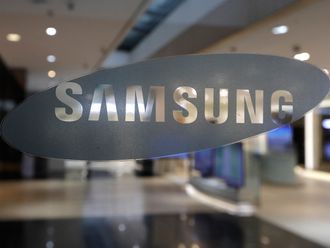Seoul: Samsung Electronics promoted its chairman's son, Jay Y. Lee, as president in a move that tightens the founding family's grip over the world's biggest memory chipmaker as it battles slower growth.
Shares in Asia's most valuable company with a market capitalision of $120 billion rose 4 percent to a record on hopes the change may bring faster execution and spur growth at a firm struggling to stop Apple's roaring march in the smartphone market.
But Samsung Chairman Lee Kun-hee, the country's richest man, may have made his biggest gamble yet by promoting his 42-year-old son with little proven management track record.
"With this management reshuffle, and the promotion of younger generation of the controlling family, some clarity has been given in that investors get a sense of where the group and affiliates headed," said Kang Sun-sik, senior fund manager at Woori Asset Management, which owns shares in Samsung Electronics.
Almost as reclusive as his father, the younger Lee has long been viewed as being groomed to head the Samsung Group, founded by his grandfather in the 1930s.
However, it won't be an easy task for Jay Lee to match the performance of his father, who has helped Samsung overtake Hewlett-Packard as the world's biggest technology firm by revenue and has reported record results each quarter this year, often beating even the most bullish street estimates.
Samsung Electronics is 50 percent owned by foreign investors.
The promotion of Jay Lee, the only son of chairman Lee, comes only a year after he was named executive vice president to take the newly created COO title December last year.
Prior to Lee's promotion, his father, 68, has repeatedly said Samsung needs nimble management and young talents capable of dealing with fast changing markets and there would be large-scale management reshuffle this year, signalling he would put a new face on the 41-year-old technology giant.
"Today's announcements are aimed at leading the way through the rapid changes of the 21st century... highlight the intention to increase the role of young and innovative executive leadership, while providing impetus to the new growth businesses," Samsung said in a statement.
Lee, who has a bachelor's degree in East Asian history from Seoul National University, joined Samsung in 1991 but spent most of his time studying MBA from Keio University in Japan and the doctoral programme at Harvard Business school before becoming a senior manager a decade later in 2001.
The elder Lee returned as Samsung chairman in March, nearly two years after he stepped down following a legal scandal. He was granted a presidential pardon in late 2009 over a conviction for tax evasion.
Samsung is the latest company bringing in its founding family to the top management.
In September, LG Electronics Inc replaced its CEO with its founding family to help turn around its struggling mobile business. Toyota Motor named its founding family scion Akio Toyoda as president last year to lead it through the global crisis that slashed demand for cars.
Samsung also promoted Choi Gee-sung, chief executive of Samsung Electronics, as vice chairman, as South Korea's biggest business conglomerate revived its central office last month to tighten its grip over some 60 business units.
Lee will continue to keep his chief operating officer title and Choi will also stay as CEO of Samsung Electronics. There are more than a dozen presidents at Samsung Electronics and two vice chairmen under chairman Lee.
YOUNG GENERATION
Samsung also promoted Lee Boo-jin, daughter of Samsung Electronics chairman Lee, as president and chief executive of Hotel Shilla .
Shares in Hotel Shilla jumped 4.3 percent after the announcement.
"There are broader expectations about the new, young generation that will lead the group now. And Ms. Lee in particularly has a very strong track record of achievement at Hotel Shilla," said an analyst who declined to be named.
"However Jay Y. Lee has homework to do here."
Samsung said Lee, as COO, has strengthened the strategic relationships with key global customers and business partners, and solidified its leadership position in chips and displays with preemptive business investments.
Since he finished school, Lee has been on a fast track to power, undertaking senior roles such as chief customer officer of Samsung Electronics and an executive title for S-LCD, Samsung's flat-screen joint venture with Japan's Sony Corp .
One of his lowest moments came in 2000, when he ran Samsung's Internet business during the dot com boom and the firm incurred losses of some 20 billion won loss before folding the business.
Samsung Group: Key facts
Following are some key facts about the Samsung Group and the Lee family that founded and runs it.
THE BEGINNING
Samsung was launched in 1938 when Lee Byung-chull, the son of a wealthy landowner and rice miller, opened a trading company.
To increase revenue, Lee added a trucking business but Samsung, which means "three stars", did not take off until around the 1950-1953 Korean War when Lee added a textile company, started South Korea's first major sugar refinery and built a powerful trading network.
THE GREAT EXPANSION
In the 1960s and 1970s, Lee added a dizzying array of companies to the group, including the Shinsegae department store, the JoongAng Ilbo daily newspaper, a shipbuilder, a chemical company and, most importantly, Samsung Electronics.
It was during this time that the family-run conglomerates known as "chaebol" formed a close alliance with the government run by authoritarian President Park Chung-hee to lift the economy.
Samsung was then an also-ran, with Daewoo, Hyundai and Lucky Goldstar, now known as LG, at the top of the pack.
THE TRANSITION
Lee Kun-hee, after being groomed for the top spot for years, officially took over when his father died in 1987. Father and son both went to university in Japan.
The younger Lee changed the focus of the company from a mass-producer of lower-end goods to one that would use innovation and superior products to build a respected brand name.
Under his reign, Samsung became the country's largest conglomerate with around 60 affiliates, accounting for a fifth of the country's exports. The group had assets of 344 trillion won ($300.7 billion) as of end-2009, and sales of 220 trillion won, according to its website.
Samsung Electronics is now the world's biggest maker of memory chips, LCD flat screens and TVs and the No.2 producer of mobile phones. The group also includes Samsung Heavy Industries, the world's No.3 shipbuilder, and South Korea's biggest life insurance company, Samsung Life.
PRESIDENTIAL PARDON
In March 2010, scandal-hit Samsung Group chairman Lee Kun-hee returned as the chairman of Samsung Electronics, the group's flagship firm and South Korea's biggest company.
Lee stepped down from his chairmanship in 2008 after being embroiled in a scandal where Samsung Group executives were indicted on suspicion of brokering a deal to give his children greater ownership of a de facto holding firm of the group.
He was cleared of the charge but handed a suspended three-year jail term for tax evasion.
Lee was granted a presidential pardon in December 2009 to help the country bolster its bid to host the Winter Olympics in 2018. The International Olympic Committee was able to reinstate Lee after the pardon was issued.
The slightly built, soft-spoken and reclusive Lee is seen as the symbol of South Korean capitalism.
THE NEXT GENERATION
Lee Kun-hee's son, Jay Y. Lee, also known as Lee Jae-yong, began working in a Samsung Group division in 1991 and has spent many years with the flagship Samsung Electronics, where he is considered the heir to the throne.
Lee, who was chief customer officer from January 2007 to April 2008 before working with the company in China, is seen likely to take over from current chief executive Choi Gee-sung, who took up his position in December 2009. Jay Lee took a newly created chief operating officer in December 2009.








